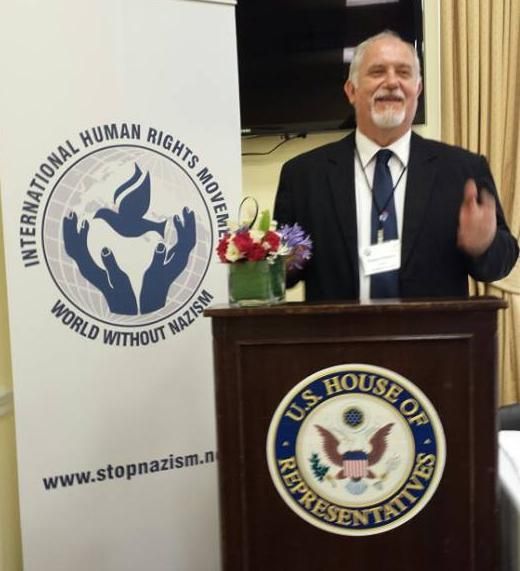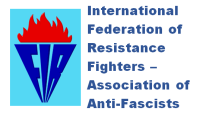A washingtoni kongresszus épületében 2013. június 4-én rendezett „Nácizmus nélküli világért” konferencián mondott beszédet a MEASZ-FIR elnöke, Hanti Vilmos. Beszédét az alábbiakban közöljük:
Hanti Vilmos: Magyarország a nácizmus kapujában
A „Nácizmus nélküli világért” konferenciája előadása
The US Congress, Washington, C.D., 2013. július 4.
Tisztelt Elnök Úr, Tisztelt Hölgyeim és Uraim!
Köszöntöm Önöket a 68 éves Magyar Ellenállók és Antifasiszták Szövetsége és a 62 éves FIR, az Ellenállók Nemzetközi Szövetsége-Antifasiszta Szervezet elnökeként. Örömmel jelentem be Önöknek, hogy létrejött a Nácizmus Nélküli Világért legújabb ága, a „Magyarország Nácizmus Nélkül” mozgalom.
A FIR az egykori partizánszervezetek, a Hitler-ellenes koalíció és a náci rezsim üldözötteinek ernyőszervezete. Három alapvető célt követ, amely teljesen megfelel a "World Without Nazism" törekvéseinek:
1./ Az antifasiszta harcosok, a koncentrációs táborok túlélői és a nácizmus áldozatai emlékének és hagyatékának a megőrzése.
2./ Aktív politikai tevékenység kifejtése a nácizmus, a rasszizmus és az antiszemitizmus újjáéledése ellen.
3./ Fontos feladatnak tartjuk a világban előforduló konfliktusok békés eszközökkel való kezelésének elősegítését. E törekvésünkért az ENSZ a FIR-nek 1987-ben a "Béke Nagykövete" címet adományozta.
Kedves Barátaim!
Magyarországról jöttem. Ez egy kis ország Európa közepén. Hazám az I. világháború után éppen a mai napon, 1920. június 4-én elvesztette területének kétharmadát. Később Hitler oldalán az utolsó pillanatig részt vett a II. világháborúban – főleg a korábban elvesztett területek visszaszerzésének reményében.
Én azokat képviselem a FIR mellett, akik Magyarországon a hivatalos náci politikával szembeszálltak, politikai és fegyveres ellenállóként, partizánokként hozzájárultak az 1945-ös békéhez, a nácizmus akkori legyőzéséhez.
68 évvel a nagyszerű antifasiszta győzelem után azt tapasztaljuk, hogy a nácizmust végérvényesen nem lehetett legyőzni. Az 1989-es demokratikus átmenet óta egyre erősebben jelenik meg a szélsőjobb, nem csak ideológiájával, de tevőleges cselekvéssel is. 2010-től a Magyar Parlamentbe önállóan bejutott a szélsőjobb pártjaként a „Jobbik”, amelynek jelenleg 18 %-on áll a népszerűsége. A magyar szélsőjobb sokféle szerveződésből áll. Döntő többségükre jellemző a demokráciaellenesség, az antiszemitizmus, a cigánygyűlölet, a homofóbia, a bevándorlóellenesség, az idegengyűlölet az anticionizmus, az Amerika- és Európaellenesség. Ugyancsak jellemző rájuk az elvesztett magyarországi területek visszaszerzésére való törekvés, a militáns mentalitás megerősítése, a nacionalizmus, a kizárólagosságra törekvés, az intolerancia, a jó magyar hamis mítoszának a terjesztése.
A magyarországi emberek egy része máig nem heverte ki az egykori felelőtlen országvezetők rossz döntéseiből adódó területvesztést, illetve azt, hogy országhatárokon túl maradtak rokonai.
Könnyű ezért meglovagolni a populista vezetőknek ezt a nagy frusztrációt. Az egyik legsúlyosabb problémánk ma az, hogy a demokrácia az elmúlt 23 évben képtelen volt átfogóan kezelni a cigányok helyzetét. A gazdasági válságban ők azok, akik legkevésbé tudják korábbi életfeltételeiket megtartani. Védtelenként könnyen válnak a szélsőjobb célpontjává. Megfélemlíti őket a paramilitáns Magyar Gárda és annak különféle variációi felvonulásokkal, erődemonstrálással.
A szélsőjobb gyakran a valós társadalmi problémák egy-egy részelemét nagyítja föl, azonban azok megoldására embertelen, populista, hamis választ ad. Érzelmi ráhatással a kiszolgáltatott, reményt vesztett embereknek könnyen tud látszólagos menedéket nyújtani. A fokozódó elszegényedést és a napi megélhetési gondokkal küzdő embereket felhasználva a problémákért hamis módon egyes csoportokat, személyeket tesz felelőssé, ezzel szítja ellenük a gyűlöletet. Ide tartoznak a zsidók is. A szélsőjobb egyik képviselője a Magyar Parlamentben már odáig ment el, hogy a zsidó származású képviselőkről nyilvántartás készítését indítványozta, a másik jobbikos képviselő pedig a holokauszt tényét kérdőjelezte meg.
A szélsőjobb már nem „csak” származási alapon üldöz népcsoportokat. Az ellenük föllépőket a korábbi verbális inzultálások után már fizikailag is bántalmazza. Engem is egy antifasiszta tüntetés után 15-20 fős szélsőjobbos fiatal banda támadott meg a múlt év őszén.
Mindezek igazolására kérem tekintsenek meg egy, olyan videoklippet, amelyet az elmúlt néhány év eseményeiből állítottam össze kollégáimmal. Láthatnak majd rasszista, xenofób, homofób, antiszemita attrocitásokat bemutató képeket, antifasiszta demonstrációk és kormány ellenes megmozdulások képeit. Egy-egy pillanat erejéig bemutatom önöknek a Magyarországon működő félkatonai szervezetek megfélemlítő tevékenységét, a magyarországi könyv és zászlóégetés, illetve zsidótemető meggyalázásának képeit a mélyszegénységet ábrázoló képsorokkal. A filmben megjelennek az ellentüntetések képei, a tiltakozások a kormány politikája ellen, a demokratikus érzelmű emberek megnyilvánulása is.
Szélsőjobb számos országban létezik, de más országokban a kormányok legtöbbször igyekeznek mindent megtenni annak visszaszorítására. Magyarországon sajnálatosan nem ez a helyzet. Azt tapasztaljuk, hogy a kormánypártok nem hogy nem határolódnak el a szélsőjobbtól, hanem ezer szállal kötődnek hozzá, sok esetben a szélsőjobb programját valósítják meg. A kétharmados többségben lévő kormánypárt ahhoz a két világháború közötti horthysta ideológiához kanyarodott vissza, amely meghozta a zsidótörvényeket, amely az egykori elcsatolt területek visszaszerzéséért küzdött, amikor a kis Magyarország tragikomikus módon hadat üzent az Egyesült Államoknak, a Szovjetuniónak. Ez a fasizálódó politika sodorta bele Magyarországot Hitler oldalán a II. világháborúba.
1945-ben Magyarországot az antifasiszta koalíció fölszabadította. Amíg a humanisták, az antifasiszták szerte az országban ezt ünnepelik, addig a mai Honvédelmi Minisztérium azokat a magyar katonákat dicsőíti, akik Hitler oldalán harcoltak.
Az Orbán-kormány kétharmados többségével egy tekintélyelvű rendszert hozott létre, ennek következtében lebontja a jogállamot, az alkotmányt pillanatnyi érdekei szerint folyamatosan módosítgatja, jelentősen korlátozza a sajtószabadságot. A közoktatás rendszerét visszaállítja a két világháború közötti időre. A jelenleg regnáló kormány megteremtette az állami korrupció kereteit. Szűk családi, baráti körbe kerülnek az állami javak, miközben a társadalom nagy része kirekesztődik a közszolgáltatásból. Jelentősen növekszik a mélyszegénység. A szegényeket a kormány nem segíteni igyekszik, hanem helyzetüket kriminalizálja. Jellemző, hogy e közben a miniszterelnök hobbyjának megfelelően költséges futball stadionok épülnek az országban, az egyik éppen a miniszterelnök vidéki háza mellett néhány méterre.
A mai Magyar Kormány dicsőíti az egykori szélsőjobboldali, antiszemita parlamenti képviselőket. Felhasználja a keresztény egyházakat, miközben a vallásszabadságot jelentősen szűkíti. Olyan személyeknek ad állami kitüntetést, akik antiszemiták, a szélsőjobb ismert képviselői.
Horthy Miklós szellemében hoz létre szimbólumokat, utcanévtáblákat cserélget, elbontja az I. köztársaság miniszterelnökének szobrát, a Horthy-korszak idejének mintájára még a Parlament környékét is visszaalakítja. Le akarja bontani a szovjet hősi emlékművet, miközben náci típusú rendezvényeket támogat. A kormánypolitika elveszi a teret az önszerveződő társadalom elől, kívülről és felülről beavatkozik a civil életbe, a szakmai szervezetek munkájába. Legyengíti a civil szervezeteket, azokat elsorvadásra készteti. Különösen igaz ez az antifasiszta szervezetek munkájának anyagi ellehetetlenítésére. Rátelepszik a kultúrára, színházi vezetőnek szélsőjobboldali, antiszemita személyeket nevez ki.
Az államhatalom demokráciában szokatlan mértékben az élet minden fontos területére kiterjedt. A kormányfő karizmatikus legitimációja ugyan még nem szilárdult meg, de politizálását nem a nyilvánosság előtti egyeztetések és kiigazítások jellemzik. A kormánypárt jelentős, nyomasztó médiatúlsúllyal rendelkezik.
A Magyar Kormányra a külpolitikában is az elszigetelődés a jellemző. Aki bírálja a kormányt, azt hazaárulónak, ellenségnek, idegen szívűnek nevezik.
Ma már tehát sebesen haladunk a demokráciából egy tekintélyuralmi rendszerbe. Az autoriter Orbán-kormány működésére jellemző a döntések nyilvánosságának a hiánya, a rendszer működése nem ész-okokra, hanem a rendszer és vezetői iránti lojalitásra, nem a szaktudásra, hanem a politikai megbízhatóságra épül.
A nácizmus ma már megjelent a magyar politikában, az autoriter hatalomtól megrontott társadalom kezdi elveszíteni védekezőképességét.
A magyarországi politikai csatározások névlegesen a jobb- és baloldal között zajlanak. A választóvonal ma mégsem a jobb- és baloldal között húzódik, hanem a tekintélyuralmi rendszer kiépítését ellenzők és az azt kritikátlanul elfogadók között. A jobbközép és a szélsőjobb között ingadozó politikát a leghatásosabban balról lehet bírálni. Ma már azonban ez kevés. A politikai voluntarizmus és a mindent átható központosítás eluralkodása, a felfokozott érzelmek tartósítása, az állandósult harc, az állandósult „forradalom”, a politika által kijelölt ellenséggel szemben olyan fejlemények, amelyek nem fogadhatók el, és nem hagyhatók jóvá a politikai paletta jobb oldalának jelentős részén sem. Az Orbán rezsim legyőzésére keresni kell az összefogást a demokratikus jobb és bal között annak érdekében, hogy megállítható legyen a további szélsőjobbra tolódás.
Magyarországon ma veszélyes időket élünk. Úgy tűnik, a magyar társadalom összetartó ereje nem elégséges ahhoz, hogy megakadályozza az autoritárius politikai rendszerbe való átfordulás megszilárdítását. Az erősebb diktatúra bevezetésének még nincs meg a társadalmi elfogadottsága, de az egymással versengő politikai értékek helyett az emberek egyre szélesebb körében elfogadottá válik az uralkodó véleményhez való elvtelen igazodás. Ilyen például az is, hogy a megfélemlített, megvásárolt sajtóban egyre inkább erősödik a kormányzati akaratot is „túllihegő” öncenzúrázás.
A kormánypárt nem csökkenő népszerűsége ellenére az autoriter politikai hatalom apológiája egyre növekvő mértékben vállalhatatlan a humanista emberek számára. A polgári demokrácia hívei nem ismerik el a kialakuló tekintélyelvű rendszert sajátjukként. Ebben a szorító helyzetben össze kell fognia egymással a politikai bal- és jobboldalhoz sorolt értelmiségieknek, hogy közösen legyenek képesek eleget tenni társadalmi felelősségüknek, és figyelmeztessenek az egyre erősödő demokrácia-deficitre.
Ez a feladat sürgető. különösen, ha figyelembe vesszük azt, hogy az egy év múlva sorra kerülő választások a választási törvény kontroll nélküli önhatalmú, szűkítő megváltoztatása okán a jelek szerint kevés esélyt kínálnak a jelenlegi ellenzéknek ahhoz, hogy leváltsák a kormánypártot.
A huszonegyedik század Magyarországán, az Orbán-kormány, a szélsőjobb nacionalista ideológiáját, a Jobbik által képviselt náci ideológiát tudatosan építi be politikájába és intézkedéseibe.
A kormánypárt önmagát nemzeti oldalnak nevezve, kisajátítja a nemzeti gondolatot, nacionalista politikát folytat. Ugyanakkor retorikájában a kormány „szocialistának tűnő kifejezéseket hangoztat. Nem áll messze a második világháborút megelőző nemzeti szocialista, fasiszta, náci gondolkodástól. Sajnálatosan kell kijelenteni: Magyarország a nácizmus kapujában áll!
A mai Magyarországon nincsen klasszikus értelemben vett konzervatív párt. A demokratikus kiút keresésének előfeltétele tehát a konzervativizmus híveinek leválasztása az Orbán-rendszerről. Orbán politikája a konzervatív eszmények felől nézve sem vállalható. Az autokratikus hatalmi eszközök elfogadhatatlanok, mert megsértik a történelem logikáját: nem engedik érvényre jutni azt, ami a szerves fejlődés eredménye. A kiválóság értékei a szabadság kis köreiből nőnek ki egymáson átívelő nemzedékek munkája révén. Konzervatív nézőpontból sem igazolhatók olyan alakok, mint Mussolini vagy Franco, de Haider, Meciar vagy Orbán sem. Így az antifasizmus elérhető közös platform a konzervatívokkal való együttműködésben.
A magyar kormány retorikájában nácizmus ellenes szólamokat hangoztat, Orbán Viktor deklarálta: „A Kormány a legszigorúbban fellép minden szélsőséges, rasszista, antiszemita megnyilvánulás ellen...Egyúttal világossá teszi, hogy az ország valamennyi polgárát megvédi az ilyen támadásoktól.” Azonban ez a mindennapokban csupán üres propaganda, hiszen a valóságban egyre több a rasszista, antiszemita atrocitásról értesülhetünk és tanúi lehetünk a szélsőjobboldali tendenciák erősödésének. Az Orbán-kormány nem tesz semmit a gyűlöletbeszéd elterjedése ellen és ami ebből következik, szaporodnak Magyarországon a gyűlölet-bűncselekmények.
Azzal kezdtem, hogy örömmel jelentem be önöknek, létrejött a Nácizmus Nélküli Világért legújabb ága, a „Magyarország Nácizmus Nélkül” mozgalom. Azt gondolom, hogy nagyon nagy a baj, ha ma szükség van egy ilyen mozgalom aktív jelenlétére. Szomorú vagyok azért, hogy 68 évvel a fasizmus leverése után ez az ideológia jelentős növekedésnek indult hazámban. Mi Magyarországon ezért építeni szeretnénk a Nácizmus nélküli világért mozgalom tapasztalataira, segítségére. 2013-ban Magyarország a nácizmus kapujában áll. Közös felelősségünk, hogy ne lépjen be a kapun!
Köszönöm a figyelmüket.
---
Vilmos Hanti : Hungary - at the gate of Nazism
Presentation at the conference of „World Without Nazism”
US Congress, Washington, D.C. June 4, 2013
Honorable Chairman,
Honorable Ladies and Gentlemen,
I greet you as the President of the sixty-eight year old Alliance of the Hungarian Resistance Fighters and Antifascists and the sixty-two year old FIR, the International Federation of Resistance Fighters – Antifascist Alliance. I am pleased to announce that “Hungary Without Nazism”, a new branch of the World Without Nazism movement, has been established.
FIR is an umbrella organization of the former partisan organizations, the Anti-Hitler coalition and the persecuted persons of the Nazi regime. It has three basic goals which are fully compliant with the aims of the movement of “World Without Nazism”:
1. Preserving and remembering the heritage of the antifascist fighters, the survivors of concentration camps and the victims of Nazism.
2. Active political actions against Nazism, racism and anti-Semitism.
3. Facilitating the peaceful resolution of conflicts that occur around the world. The United Nations honored our strives by awarding FIR in 1987 with the “Messenger of Peace” title.
My dear Friends,
I come from Hungary, which is a small country in Central Europe. Following World War I, exactly ninety-three years ago, on this day my homeland lost two thirds of its territory. Later it took part in the Second World War on Hitler’s side till the last moment mainly in the hope of regaining the previously lost territories.
Besides FIR, I represent those who resisted Nazi policy in Hungary as either political or armed resistance fighters, partisans and thus contributed to peace in 1945, helping to defeat Nazism at the time.
Sixty-eight years after the glorious victory over fascism, we unfortunately see that Nazism could not be permanently overcome. Since the democratic transition in 1989, the far-right is not only emerging stronger with its ideology but also with its proactive actions. In 2010, the far-right party ‘Jobbik’, succeeded in entering independently the Hungarian parliament and its popularity now stands at 18 percent. The Hungarian far-right consists of many different organizations. The majority of them all show the main characteristic features, such as being anti-democratic, anti-Semitic, anti-Gypsy, homophobic, anti-immigrant, xenophobic, anti-Zionist, and hold anti-American and anti-European stances. It is also characterized by revisionist thoughts, and by the pursuit of recovering Hungary’s lost territories; strengthening the militant mentality, extreme-nationalism, quest for exclusivity and intolerance, spreading the false myth of what they consider being “good Hungarian”.
Some people in Hungary have still not recovered from the loss of the country’s territory, which was caused by the poor and irresponsible decisions of former state leaders and also from the fact that their relatives are situated beyond the country’s recognized borders.
It is easy for the populist leaders to ride on these enormous frustrations. One of the most serious problems that we face today is that the country in its twenty-three years of democracy has been unable to deal comprehensively with the situation of the Gipsy minority. They are the ones who are least able to maintain their previous living conditions in the economic crisis. They are easily exposed to, and become the target of, the far-right. They are terrorized by the paramilitary ‘Hungarian Guard’ and its different variations with parades and power demonstrations.
The far-right often overstates parts of the real social problem; however they give inhuman, populist and false answers for solving them. With emotional influence it can easily offer apparent shelter to vulnerable, hopeless people. The far-right uses the growing impoverishment, and the ever growing number of people with precarious livings to declare falsely a certain group of people or individuals, responsible for the problems, thus stirring up hatred against them. The Jews fall into this group also. A representative of the far-right party in the Hungarian parliament has gone so far that he even suggested preparing lists about the Jewish MPs, while another far-right representative even questioned the occurrence of the Holocaust.
The far-right persecutes ethnic groups not only on the basis of origin. Those who stand up against them are not only insulted verbally, but are abused physically as well. I myself was attacked by 15-20 far-right youngsters after an anti-fascist demonstration in the autumn of last year.
To demonstrate these events of the past few years, please allow me to show you a video, compiled by my colleagues. You will see racist, xenophobic, homophobic, anti-Semitic images showing atrocities, anti-fascist demonstrations and pictures of anti-government protests. I present you the intimidating activities of paramilitary groups operating in Hungary, burning of books and flags, the images of desecrated Jewish cemeteries, and pictures depicting extreme poverty. The film also shows images of anti-fascist demonstrations and protests against the government’s policy,expressing the feelings of people with democratic values.
The far-right exists in many countries, but, in other states, the government tries to do everything to suppress them. Unfortunately, in Hungary this is not the case. We see that the ruling parties do not restrain themselves from the far-right and are actually linked to it. Moreover, in many cases, they implement the program of the far-right. The ruling parties, which have a two-thirds majority in the parliament, have turned to the Horthy-ideology that existed between the two world wars. The Horthy-era was the one that adopted the anti-Jewish laws and struggled to regain the former ceded territories. It was the time when Hungary declared war in a tragicomic manner against the United States and the Soviet Union. This fascist policy drove Hungary into the Second World War on the side of Hitler.
Hungary was liberated by the antifascist coalition in 1945. While the humanists, and the anti-fascists celebrate this throughout the country, the present Hungarian Ministry of Defense honors those soldiers who fought on Hitler's side.
The Orbán-government with its two-thirds majority has set up an authoritarian system, which breaks down the rule of law; by constantly modifying the constitution according to its present interests; and significantly restricts the freedom of press. The public education policy is returning to the period between the two world wars. The current reigning government established the framework of public corruption. In the form of nepotism, public goods go to close family circles, or to friends, while a large part of society is excluded from the public service. Deep poverty is significantly increasing. The government is not trying to aid the poor, but instead, it is criminalizing their status. In the meantime, expensive football stadiums are being built in the country in accordance with the prime minister's hobby. In addition, one of them was built just a few meters away from the prime minister's countryside residence.
The present Hungarian government glorifies former far-right and anti-Semitic parliamentarians. It uses the Christian church, while significantly restricting the freedom of religion. It gives state awards to people who are anti-Semitic and are well-known representatives of the far-right.
The present ruling parties create symbols in the spirit of Miklós Horthy. They change street names, demolished the statue of the Prime Minister of the first Hungarian Republic, and they even convert the surroundings of the Parliament back to the model of the Horthy era. The government wants to tear down the monument to the Soviet heroes while supporting Nazi-like events.
The policy of the government takes away the opportunity and space from the self-organizing civil societies, interferes with civic life from above and intimidates organizations of professionals. It weakens the civil society organizations and makes them wilt. This is especially true towards the work of anti-fascist organizations, which are materially undermined. It establishes itself in the culture also, appointing far-right, anti-Semitic persons to the post of theatre managers.
Unusual for a democracy, the state power has spread itself into every important aspect of life. The charismatic legitimacy of the head of government has not yet been solidified, but his politics is not characterized by public consultations or adjustments. The ruling parties have significant and heavy media preponderance.
The Hungarian government's foreign policy is characterized by isolation. Those who criticize the government are called traitors, enemies, and “alien-hearted”.
Today we are moving fast from democracy to an authoritarian system. The lack of publicity of the decision-making is typical for the operation of the authoritative Orbán-regime. The operation of the system is built not on rational causes, but on loyalty to the system and its leadership, not on competence, but on political reliability.
Nazism has already appeared in the Hungarian politics, and the society corrupted from the authoritarian power is losing its immunity.
The political battles in Hungary are fought nominally among the right and the left. Nowadays though, the dividing line runs not along the right and the left sides, but among those who oppose the establishment of an authoritarian system and those who accept it uncritically.
The politics oscillating between the centre right and far right is best judged from the left-wing. But nowadays this is not enough. The dominance of political voluntarism and all-encompassing centralization, the preservation of heightened emotions, the constant war and “revolution” are all such developments, designated by the politics against the “enemy” that are not only unacceptable, but are not compatible with a significant part of the right-wing political spectrum. We must look for a way to unite the democratic right and left in order to overthrow the Orbán-regime and to stop the swing to the far-right.
Now we live dangerous times in Hungary. It seems that the Hungarian society’s cohesion is incapable of preventing the system turning into a consolidated authoritarianism. The implementation of a more powerful dictatorship is still not accepted by society, yet instead of the competing political virtues, people are increasingly aligning themselves to the ruling unprincipled belief, and this belief is becoming more widely accepted. An example for this is the intimidated (and corrupted) media that is increasingly overemphasizing the government’s will in an ever more self-censuring way.
Despite the fact that the ruling party’s popularity isn’t decreasing, the apologia of the authoritarian policy is becoming untenable for people with humanist feelings. The advocates of civil democracy do not recognize the onset of the authoritarian system as their own. In this tenacious situation, the intellect of the political left- and right-wing have to join forces so that they will be able to comply with their social responsibilities and warn us about the ever growing democracy deficit.
This task is urgent. Especially if we take into account that the current opposition has little chance of winning the next year’s elections against the ruling party due to the uncontrolled, arbitrary and downsizing electoral laws. Twenty-first century Hungary under the Orbán-government is consciously incorporating the nationalist ideology of the extreme right, and the Nazi ideology represented by the Jobbik in its policies and measures.
By referring to itself as the national side, the ruling party appropriates the national idea for itself and pursues a nationalistic policy. However, in its rhetoric the government voices seemingly “socialist” phrases. It does not stand far from the national socialist, Nazi and Fascist thinking that prevailed on the eve of the Second World War. Sadly, it must be stated that: Hungary is standing at the gate of Nazism!
Today in Hungary, we cannot talk about a conservative party in a classical sense. The prerequisite of finding a democratic egress is to detach the adherents of conservatism from the Orbán-regime. Orbán’s policies are unacceptable even to the conservative ideals. According to these ideals, the autocratic power mechanisms are not acceptable because they violate the logic of history: what can lead to integral development is not permitted to be enforced. Pursuant to them, the value of excellence grows from small circles of freedom through the work of generations. From the conservative point of view, figures such as Mussolini or Franco are not justified; neither are Haider, Meciar or Orbán. Hence, antifascism is the accessible platform for cooperation with the conservatives.
The Hungarian government voices the anti-Nazism rhetoric; Viktor Orbán declared that, “the Government will step up rigorously against any kind of extremist, racist, anti-Semitic action. […] In addition it makes it clear that it will defend every citizen from such actions.” However, on a daily basis it is simply empty propaganda. In reality, we hear about more and more racist, anti-Semitic atrocities and are witnesses to the ever growing far-right tendencies. The Orbán-regime is not doing anything against the spread of hate speeches in Hungary, and consequently the number of hate crimes is increasing.
I started by saying that I am happy to announce that a new branch of the “World Without Nazism” movement, “Hungary Without Nazism” was established. I think that Nazism is a grave problem in our world today, and we are in need of the active presence of such a movement. It saddens me, that after the defeat of fascism sixty-eight years ago, this ideology has started to spread in my homeland. This is why we want to build on the experiences and assistance from the “World Without Nazism” movement.
In 2013, Hungary is standing at the gate of Nazism. It is our collective responsibility for this country to stop Nazism!
Thank you very much for your kind attention.

2013. június 4.






